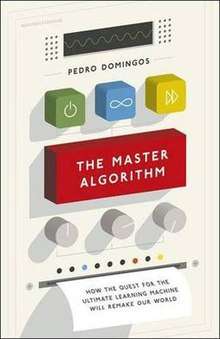The Master Algorithm
The Master Algorithm: How the Quest for the Ultimate Learning Machine Will Remake Our World is a book by Pedro Domingos released in 2015. Domingos wrote the book in order to generate interest from people outside the field.
 | |
| Author | Pedro Domingos |
|---|---|
| Country | United States |
| Language | English |
| Subject | Artificial intelligence |
| Genre | Philosophy, popular science |
| Publisher | Basic Books |
Publication date | September 22, 2015 |
| Media type | Print, e-book, audiobook |
| Pages | 352 pp. |
| ISBN | 978-0465065707 |
The book outlines five tribes of machine learning: inductive reasoning, connectionism, evolutionary computation, Bayes' theorem and analogical modelling. The author explains these tribes to the reader by referring to more understandable processes of logic, connections made in the brain, natural selection, probability and similarity judgements. Throughout the book, it is suggested that each different tribe has the potential to contribute to a unifying "master algorithm".
Towards the end of the book the author pictures a "master algorithm" in the near future, where machine learning algorithms asymptotically grow to a perfect understanding of how the world and people in it work.[1] Although the algorithm doesn't yet exist, he briefly reviews his own invention of the Markov logic network.[2]
In the media
In 2016 Bill Gates recommended the book, alongside Nick Bostrom's Superintelligence, as one of two books everyone should read to understand AI.[3] In 2018 the book was noted to be on Chinese President Xi Jinping's bookshelf.[4]
Reception
A computer science educator stated in Times Higher Education that the examples are clear and accessible.[5] In contrast, The Economist agreed Domingos "does a good job" but complained that he "constantly invents metaphors that grate or confuse".[6] Kirkus Reviews praised the book, stating "Readers unfamiliar with logic and computer theory will have a difficult time, but those who persist will discover fascinating insights."[7]
A New Scientist review called it "compelling but rather unquestioning".[8]
References
- "Pedro Domingos' Master Algorithm: How machine learning is reshaping how we live". Slate.com. Retrieved September 26, 2015.
- Domingos, Pedro (2015). The Master Algorithm: How machine learning is reshaping how we live. pp. 246–7.
- Ha, Thu-Huong (2016). "Bill Gates says these are the two books we should all read to understand AI". Quartz. Retrieved 4 March 2018.
- Huang, Zheping (2018). "The two books helping China's Xi Jinping understand artificial intelligence". Quartz. Retrieved 4 March 2018.
- "The Master Algorithm: How the Quest for the Ultimate Learning Machine Will Remake Our World, by Pedro Domingos". Times Higher Education (THE). 17 September 2015. Retrieved 4 March 2018.
- "Machines for thinking: artificial intelligence." The Economist, 3 Oct. 2015, p. 86(US).
- "THE MASTER ALGORITHM by Pedro Domingos | Kirkus Reviews". 2015. Retrieved 4 March 2018.
- "The Master Algorithm: A world remade by machines that learn". New Scientist. 2015. Retrieved 4 March 2018.